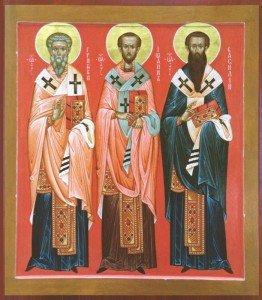 I suspect that at times this article probably becomes rather obtuse, especially when attempting to deal with all the debates that went on about the nature of Christ. This article is about Christ as Savior in the thinking of the Eastern Fathers. I am sure that, if you have been following this article, you have come to the awareness of the struggle that the Church went through in order to come to the understanding about Christ that we presently have as a Christian Church. The struggles of the Fathers led to this awareness: Christ is God incarnate and, as such, He is truly and fully God and truly and fully man and that His human behaviors and thinking were that as a human, and not as God. Because He was a man who believed in God, it was His human faith that connected Him to God. The Greek Fathers realized that He had to be fully human so that we could imitate Him. They also realized that He had to be God so that He could be the archetype of what humans were created to be.
I suspect that at times this article probably becomes rather obtuse, especially when attempting to deal with all the debates that went on about the nature of Christ. This article is about Christ as Savior in the thinking of the Eastern Fathers. I am sure that, if you have been following this article, you have come to the awareness of the struggle that the Church went through in order to come to the understanding about Christ that we presently have as a Christian Church. The struggles of the Fathers led to this awareness: Christ is God incarnate and, as such, He is truly and fully God and truly and fully man and that His human behaviors and thinking were that as a human, and not as God. Because He was a man who believed in God, it was His human faith that connected Him to God. The Greek Fathers realized that He had to be fully human so that we could imitate Him. They also realized that He had to be God so that He could be the archetype of what humans were created to be.
In the last issue I introduced the idea that during the Liturgy we are joined with Christ in offering praise to the Father. It is clear, therefore, that the prayer is being answered precisely because it is Christ Himself in the assembly and through the assembly, who offers it to His Father, whereas the members of the community are, through the power of the Spirit, his adopted children “in Christ” and, corporately, the “royal priesthood.” In them and through them Christ offers the sacrifice. He is “the one who offers, and is offered, who receives and is received, but they are inseparable from him: “For as many of you as were baptized into Christ have put on Christ,” and “God has sent the Spirit of his Son into our hears crying, ‘Abba! Father”. Third, in the Eastern Eucharistic canons, the invocation of the Spirit (epiklesis) is not an invocation on the bread and wine only – as if they were “elements” to be transformed somewhat independently of the gathered community – but on the assembly and the elements. Remember that we are asking God to transform US as we do again what Christ did at the Last Supper. In Christological terms the Eucharistic action implies that the Son of God, who assumed human nature brings that nature to his Father in a sacrifice, offered once for all, and that those who have received the same glorified nature by adoption or by grace, are joining that one High Priest, through the power of the Spirit who anointed him as Christ.
Think about this!
